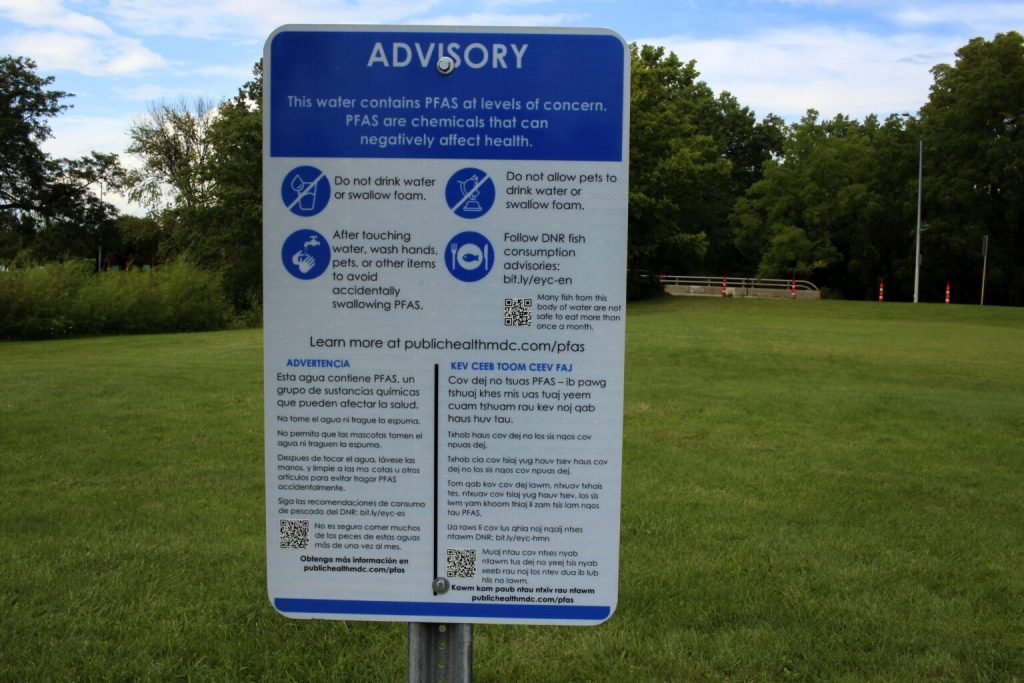Environmental Groups, Community Advocates Push for PFAS Deal
Funding approved but stalled by clash between Gov. Evers and GOP legislators.
Now that work on the state budget is complete, environmental groups and residents of communities affected by PFAS contamination believe progress can still be made on getting money out the door to help remediate water pollution across the state.
Since the last biennial budget was passed, $125 million in funds meant to help with cleaning up contamination of water from PFAS has been sitting untouched with no legislative mechanism for getting that money out to communities.
PFAS, a family of man-made chemical compounds known as “forever chemicals” because they don’t break down in the environment, have been connected to cancer and other diseases. The chemicals have been used in products such as firefighting foam and household goods such as non-stick pans and fast food wrappers. Communities across the state have found PFAS contamination in their water.
During the last legislative session, early hopes of compromise crumbled after Democrats and Republicans failed to reach agreement on a provision aimed at protecting “innocent landowners” from being subject to enforcement actions for PFAS contamination under the state’s toxic spills law by the Department of Natural Resources.
Republicans, including the bill’s author, Sen. Eric Wimberger (R-Oconto) argued the bill had to include language that protected people who have PFAS contamination on their property through no fault of their own. Democrats said the language in the bill defining innocent landowners was so broad that it would exempt property owners responsible for pollution from being held responsible.
Ultimately, Gov. Tony Evers vetoed the bill.
Wimberger and Rep. Jeffrey Mursau (R-Crivitz) authored legislation this year to get the $125 million earmarked for PFAS remediation out the door.
Sara Walling, Clean Wisconsin’s water and agriculture program director, says she’s “hopeful” that discussions between the Republican bill authors, Evers and affected residents have been productive.
“There is opportunity now I think that the budget is done for Wimberger and others, of course, to pay attention, put a little energy into this, and really sit down and hash out the provisions in there, and get to a point that there’s something hopefully that we can all live with, and that will get the money to impacted communities and private well owners and all the things that the money is intended to be used for,” Walling says.
While people see progress being made, there are still objections to the legislation. Wimberger and Mursau have proposed two bills, one of which exempts certain groups of people from enforcement under the spills law.
Exempting ‘innocent landowners’
The exemptions include anyone who spread biosolids or wastewater contaminated with PFAS onto a field while in compliance with a DNR permit; owns land on which contaminated biosolids were spread under a permit; a fire department, public airport or municipality that used PFAS-contaminated firefighting foam to train for or respond to emergencies; solid waste disposal facilities that accepted PFAS and anyone that owns, leases, manages, or contracts for property on which PFAS has moved through the groundwater (unless they caused the contamination on another piece of property).
Earlier this year, Evers suggested he’d support exempting farmers and residents from being held financially responsible for cleaning up PFAS contamination if they unknowingly caused it by spreading contaminated biosolids.
But Walling says she’d like to see that language tightened further to make sure it does not create a loophole for responsible parties.
“The provisions that are laid on that out there now just provide far too big of a loophole for who would be considered an innocent landowner in the current bill language,” she said. “And we really want to see that tightened so that truly innocent landowners, the passive receivers, the farmers out there who unknowingly were accepting municipal biosolids … those are the innocent landowners that I know that the authors are trying to protect.”
What’s an allowable level of PFAS?
The other bill creates the mechanisms and grant programs through which the $125 million would be awarded to affected communities.
Doug Oitzinger is the former mayor and a current city councilmember of Marinette and a founder of a group of community members fighting to clean up PFAS pollution in his area from the manufacture of fire suppression technologies by Tyco/Johnson Controls.
Oitzinger says he’s wary of a provision in the bill that exempts private property owners who don’t qualify as innocent landowners from enforcement under the spills law unless the level of PFAS present violates an existing state or federal standard. The federal government doesn’t regulate groundwater and for years the state Department of Natural Resources has been unable to promulgate an administrative rule that sets the allowable amount of PFAS in groundwater.
The DNR failed once because of a deadlocked vote on the state Natural Resources Board and a second time because the proposed rule had a potential economic impact greater than $10 million and therefore required approval of the full Legislature under a law known as the REINS Act.
The DNR is currently working on the economic impact analysis of another proposed groundwater standard. Oitzinger says he’s doubtful that proposal will stay clear of the REINS Act. So, he says, he’s working with Mursau to include a groundwater standard in the bill.
The most significant amendment Oitzinger is fighting for in the legislation is the creation of a temporary standard for the regulation of PFAS in Wisconsin’s groundwater.
“We’ve been working to see if legislatively, we can get something that does not undermine the spills law to get the $125 million out the door, that the governor would sign, that we would be in support of and, at the same time, establish some kind of interim groundwater standard for PFAS,” Oitzinger says.
As someone fighting for a community that’s been heavily polluted with PFAS, Oitzinger says his goal is to find a compromise that helps people get clean water, even if environmental and industry groups aren’t fully satisfied.
“It doesn’t do us any good to get into our respective camps and not find common ground,” he says. “And then the bill reaches the governor’s office and he vetoes it. That’s not helping anybody, so we’ve got to find compromise. Some of the environmental groups won’t like it, and certainly I think some of the industry lobbying groups won’t like it, but this is what we’ve got to do.”
Environmental groups, community advocates push for progress on PFAS legislation was originally published by the Wisconsin Examiner.
If you think stories like this are important, become a member of Urban Milwaukee and help support real, independent journalism. Plus you get some cool added benefits.
More about the PFAS Problem
- Gov. Evers Signs New PFAS, Lead Regulations - Danielle Kaeding - Mar 2nd, 2026
- Gov. Evers Builds Upon Efforts to Clean Up Wisconsinites Water, Approves New Rule Changes Strengthening Pfas Drinking Water Standards - Gov. Tony Evers - Mar 2nd, 2026
- PFAS Levels in Great Lakes Fish Are Dropping - Danielle Kaeding - Feb 6th, 2026
- Gov. Evers and GOP Lawmakers Near a Deal on PFAS Pollution - Danielle Kaeding - Jan 22nd, 2026
- Gov. Evers Optimistic About Reaching Final Deal With Republican Lawmakers to Secure Release of $125 Million in Long-Awaited Pfas Investments - Gov. Tony Evers - Jan 21st, 2026
- Bipartisan Push to Tell Counties Faster When Water Tests Fail - Henry Redman - Dec 19th, 2025
- MKE County: County Seeks to Sue PFAS Producers, Oil Companies - Graham Kilmer - Dec 10th, 2025
- Wisconsin Reviewing EPA-Approved Pesticides For PFAS - Danielle Kaeding - Dec 9th, 2025
- State Nears Settlement with Johnson Controls/Tyco Over PFAS Spills - Danielle Kaeding - Dec 4th, 2025
- Senate Bill Promotes Soybean-Based Firefighting Foam to Replace PFAS - Danielle Kaeding - Dec 2nd, 2025
Read more about PFAS Problem here






















